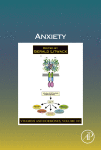Afaik are hormones involved in too many processes to make good targets for emotion controlling agents but it's not really based on data. I was interested in testosterone blockers in earlier time when I had issues with impulse control and associated that hormone with aggressive behavior but looks like it isnt that simple. Never tried an actual antitestosteronergic but drugs which suppress it, morphine and sodium valproate. Indeed they somewhat relax you but it's an anesthetic kind of relaxation and not in a good way. Loss of drive, strength, libido, depressive tendencies and low self esteem in the longer run. The rebound is horny but not aggressive.
K for sure inhibits stress response, dissociatives are very impressive about this and the fact that they selectively inhibit negative emotions and reactions yet not positive adrenaline rush or energy, drive, if used in moderation even memory. But they come with a price tag and I hope it'd ne possible to develop more selective agents especially non-central ones which would be devoid of memory inhibition, mania and psychotic features.
At least peripheral dissos inhibit morphine tolerance which is remarkable as it indicates a strong correlation with the CNS.
Theres something strange about catecholamines in that they are involved in stress and anxiety but the same amount of the same transmitters can feel pretty good or pretty hellish dependent on consciousness (might be that it's about surges though and that stims amplify them, so not sure here) but still then it should be possible to inhibit that surge.
GABAergics primarily counters glutamatergic excitation which is primarily mediated by Ca influx though NMDAr's (?) so yeah.. Interesting are Ca channel antagonists. Need to read more about them.
Interesting point about estradiol. Would have bet that it inhibits libido but then again libido != male ability, something every user of SSRIs knows. Might it be possible to develop synthetic analogues of human sex hormones with different profile that manipulate personality, and/or partial ant/agonists !??
Phermonones make me curious too. They sell cat pheromon dispensers to calm cats. Supposedly some parfums contain pig(?) phermonones but are of disputed effectivity ... oxytocin is a weird thing which appears to have unpredictable results depending on state of consciousness and emotions. Anybody knowing more about?
I too thought that emotions are an one-way reaction outwards the CNS given that psychology tells the emotion comes before the thought but when it is about stress/fear response and such this certainly isn't true as that one is learnt akin to chronic pain and involves compex reactions. Again, as peripheral NMDAi's are analgesic, this sounds promising. But maybe they don't inhibit the response but more so the initial acquirance of it - beta blockers do that, apparently you'll get less PTSD symptoms if you take one fast enough (some hours to 1-2 days?) after the experience so epinephrine/norepinephrine are involved for sure. To me, as somebody suffering from wrecked PTSD emotions, NRIs are heavy anxiogenics and clonidine is anxiolytic yet pro-depressive.
Then again, beta blockers help with performance anxiety. But nobody uses them for general anxiety and similar to my knowledge, even when they have less side effects than clonidie and apparently the fear about excessive, vasoconstrictive alpha agonism is mostly academic and not seen even in heavy stim users ...






